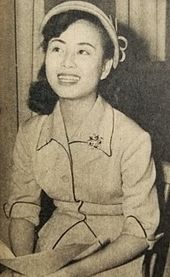Hibari Misora
Hibari Misora ( Japanese 美 空 ひ ば り , Misora Hibari, actually Katō Kazue (加藤 和 枝); born May 29, 1937 in Yokohama ( Kanagawa Prefecture ); died June 24, 1989 ) was a Japanese singer and actress.
Live and act
Hibari Misora began her career as a singer with the song "Kappa Boogie-Woogie" (河 童 ブ ギ ウ ギ) at the age of 12. Blessed with a good ear and an excellent talent for articulation, she mastered a variety of genres, from the sentimental declamatory song, called " Enka " in Japan , to jazz in English. She was the undisputed top singer in the Japanese world until her untimely death due to an illness.
More hits were
- "Apple Song" (リ ン ゴ 追 分, Ringo oiwake; 1952),
- "House in the port city" (港 町 十三 番地, Minatomachi jūbanchi; 1957),
- "Gentle" (柔, Yawara; 1964), awarded the Japan Record Award in 1965
- "Sad rice wine" (悲 し い 酒, Kanashii sake; 1966),
- "Dark red sun" (真 赤 な 太陽, Makkana taiyō; 1967),
- "Tangled hair" (み だ れ 髪, Midare-gami; 1987).
Hibari also starred in films, including a version of the " Dancer of Izu " in 1954. After her death, she was the first woman to be awarded the Medal of Honor for her musical contribution to Japan's self-discovery after the dark post-war years.
During her lifetime she recorded 1200 songs in 675 albums and singles. 68 million copies were sold. After her death, that number rose to 80 million.
literature
- S. Noma (Ed.): Misora Hibari . In: Japan. An Illustrated Encyclopedia. Kodansha, 1993, ISBN 4-06-205938-X , p. 978.
Web links
- Short biography of Midori Hibari in the Kotobank, Japanese.
| personal data | |
|---|---|
| SURNAME | Misora, Hibari |
| ALTERNATIVE NAMES | 美 空 ひ ば り (Japanese) |
| BRIEF DESCRIPTION | Japanese singer and actress |
| DATE OF BIRTH | May 29, 1937 |
| PLACE OF BIRTH | Yokohama |
| DATE OF DEATH | June 24, 1989 |

